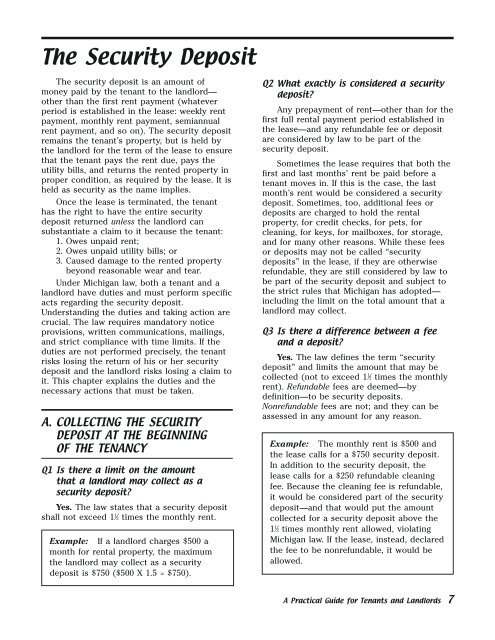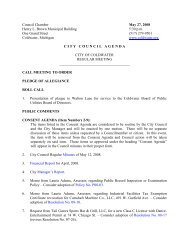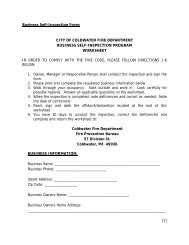Landlord Tenant Guide - State of Michigan
Landlord Tenant Guide - State of Michigan
Landlord Tenant Guide - State of Michigan
- No tags were found...
You also want an ePaper? Increase the reach of your titles
YUMPU automatically turns print PDFs into web optimized ePapers that Google loves.
The security deposit is an amount <strong>of</strong>money paid by the tenant to the landlord—other than the first rent payment (whateverperiod is established in the lease: weekly rentpayment, monthly rent payment, semiannualrent payment, and so on). The security depositremains the tenant’s property, but is held bythe landlord for the term <strong>of</strong> the lease to ensurethat the tenant pays the rent due, pays theutility bills, and returns the rented property inproper condition, as required by the lease. It isheld as security as the name implies.Once the lease is terminated, the tenanthas the right to have the entire securitydeposit returned unless the landlord cansubstantiate a claim to it because the tenant:1. Owes unpaid rent;2. Owes unpaid utility bills; or3. Caused damage to the rented propertybeyond reasonable wear and tear.Under <strong>Michigan</strong> law, both a tenant and alandlord have duties and must perform specificacts regarding the security deposit.Understanding the duties and taking action arecrucial. The law requires mandatory noticeprovisions, written communications, mailings,and strict compliance with time limits. If theduties are not performed precisely, the tenantrisks losing the return <strong>of</strong> his or her securitydeposit and the landlord risks losing a claim toit. This chapter explains the duties and thenecessary actions that must be taken. Yes. The law states that a security depositshall not exceed 1 1 ⁄2 times the monthly rent.Example: If a landlord charges $500 amonth for rental property, the maximumthe landlord may collect as a securitydeposit is $750 ($500 X 1.5 = $750). Any prepayment <strong>of</strong> rent—other than for thefirst full rental payment period established inthe lease—and any refundable fee or depositare considered by law to be part <strong>of</strong> thesecurity deposit.Sometimes the lease requires that both thefirst and last months’ rent be paid before atenant moves in. If this is the case, the lastmonth’s rent would be considered a securitydeposit. Sometimes, too, additional fees ordeposits are charged to hold the rentalproperty, for credit checks, for pets, forcleaning, for keys, for mailboxes, for storage,and for many other reasons. While these feesor deposits may not be called “securitydeposits” in the lease, if they are otherwiserefundable, they are still considered by law tobe part <strong>of</strong> the security deposit and subject tothe strict rules that <strong>Michigan</strong> has adopted—including the limit on the total amount that alandlord may collect. Yes. The law defines the term “securitydeposit” and limits the amount that may becollected (not to exceed 1 1 ⁄2 times the monthlyrent). Refundable fees are deemed—bydefinition—to be security deposits.Nonrefundable fees are not; and they can beassessed in any amount for any reason.Example: The monthly rent is $500 andthe lease calls for a $750 security deposit.In addition to the security deposit, thelease calls for a $250 refundable cleaningfee. Because the cleaning fee is refundable,it would be considered part <strong>of</strong> the securitydeposit—and that would put the amountcollected for a security deposit above the1 1 ⁄2 times monthly rent allowed, violating<strong>Michigan</strong> law. If the lease, instead, declaredthe fee to be nonrefundable, it would beallowed.





